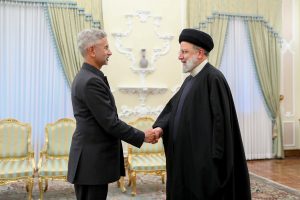Amid the cacophony of conflicts, missile strikes, and international court rulings over the past week, India’s Minister of External Affairs Subrahmanyam Jaishankar went to Tehran for a series of high-level meetings with the Iranian leadership.
Given the chaotic context into which he had waded, Jaishankar’s visit should have been a major geopolitical development. Over the last several days, the war in Gaza has expanded to engulf other parts of the region. Early this month, in the Iranian town of Kerman, two explosions by Islamic State militants claimed nearly 100 lives at a memorial for the late commander Qassem Soleimani, who was assassinated in 2020.
Meanwhile, Yemen’s Houthi rebels — who have long been backed by Iran — launched repeated attacks on commercial vessels in the Red Sea. That caused heightened tensions between Iran and India’s partners in the West. Last month, the United States accused Iran of a drone attack against a chemical vessel in the Indian Ocean — about 200 nautical miles from India’s coast. Britain’s Foreign Secretary David Cameron then called Iran “a thoroughly malign influence in the region and in the world.”
These tensions continued to boil over as Jaishankar flew to Iran. Only three days before India’s foreign minister landed in Tehran, the United States and its allies conducted strikes against various Houthi targets in Yemen. However, Jaishankar flew under the radar by deploying a studied silence. Although he lodged strong displeasure over the “perceptible increase in threats to the safety of maritime commercial traffic,” Jaishankar offered no position on the broader geopolitical fracas driving that heightened threat.
To be sure, Iran did not fail to prod him to take a position. In a statement released after their discussions, Iran said that President Ebrahim Raisi had “described the crimes committed by the Zionist regime in Gaza as clear examples of war crimes” and told Jaishankar that “it is important for India to play a role in ending the bombings, lifting the blockade of this region and realizing the rights of the Palestinian people.” Yet, although Jaishankar reiterated India’s support for a two-state solution, he refrained from calling for a ceasefire or naming either Israel or Hamas.
Instead, Jaishankar focused on New Delhi’s narrower bilateral goals: trading in the Indian rupee, gaining access to Central Asia through Iran, and increasing bilateral cooperation with Iran at the BRICS and the Shanghai Cooperation Organization (SCO). But given the far more urgent security agenda on their minds, it appears unlikely that the Iranian government would seek to prioritize these matters in the immediate term.
In light of India’s strong push all through last year to position itself as an emerging global leader, Jaishankar’s reluctance to engage publicly on the key geopolitical debates of the day might strike some as discordant. In both New Delhi and Washington, some analysts have been of the view that India’s policy of silence and neutrality — on Ukraine, Taiwan, Gaza, and other flashpoints — might help it to play the role of an effective mediator.
Yet, to the contrary, India’s silence should be seen less as a means to a larger goal and more as a goal by itself. In a fractious world where disputes appear intractable, New Delhi seems to have concluded that it has little to gain in offering an opinion or playing a more proactive problem-solving role. Instead, India hopes to use its ambiguous silence as leverage to keep warring partners guessing — often playing them off of each other.
For the most part, this strategy has worked. On Ukraine, for instance, India has shown that it can have it all without offering anything in return. Washington continues to see India as a key strategic ally, despite diminishing common ground in global debates. Meanwhile, ties with Russia have also flourished: Trade has multiplied several times since the beginning of the war in 2022, and last month, India and Russia inched closer to a landmark agreement to jointly develop weapons.
But this strategy is not without its risks for India. In the Middle East, where emotions run relatively high, partners may yet come to expect more solid commitments of support before offering much in return. The longer the war in Gaza goes, the loftier those expectations may get.































